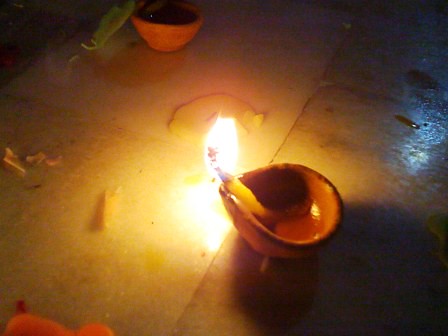The word Diwali (also spelt/pronounced as deepawali, deepavali, deewali) means “row of lamps” or “row of lights”. Today it is celebrated by Hindus, Jains, Buddhists and Sikhs across the globe as the "Festival of Lights," where the lights or lamps signify victory of good over the evil within every human being. In India Diwali is celebrated almost as a national festival, and the aesthetic aspect of the festival is enjoyed by most of the Indians all faiths.
Diwali is celebrated a day earlier in South India than in North India, since Lord Ram traveled from South India to his kingdom in North India; he passed through the south earlier, as the legends say. Hindus have several significant events associated with it, like the return of Lord Ram to Ayodhya, the killing of Narakasura, the austerities (vrata or fasting) of Shakti, birth of Goddess Lakshmi, defeat of Indra by Krishna, etc.
Many legends are associated with Diwali. Jainism marks Diwali as the nirvana of Lord Mahavira, which occurred in 527 BC. Among the Sikhs, Diwali has special significance from the day the town of Amritsar was illuminated on the return to it of Guru Hargobind Singh, who had been held captive in the Gwalior Fort by Mughal emperor, Jahangir. The festival is also celebrated by Buddhists of Nepal, particularly the Newar Buddhists.
On the day of Diwali, most of the people wear new clothes and share sweets and snacks. Some North Indian business communities start their financial year on Diwali and new account books are opened.
Homes are cleaned and decorated before Diwali. Offices perform pooja and bonuses and holidays are granted to employees. People buy property and gold. For children, fire works/crackers, new clothes and sweets make Deepavali the most eagerly awaited festival of the year.
Melas (or special markets) are organized before Diwali. At a mela there are performances by jugglers, magicians, acrobats, snake charmers, puppet shows and fortune tellers. Food stalls are set up, selling sweets and spicy foods. There are a variety of rides at the fair, including Ferris wheels and rides on animals like elephants and camels.
Diwali is celebrated in various parts of the world, in countries such as the United Kingdom, the Netherlands, New Zealand, Suriname, Canada, Guyana, Kenya, Mauritius, Fiji, Japan, Indonesia, Malaysia, Myanmar, Nepal, Singapore, Sri Lanka, South Africa, Tanzania, Trinidad and Tobago, Jamaica, Thailand, United Arab Emirates, Australia, much of Africa, and the United States, where people of Indian origin or people associated with the legends associated with Diwali live and their friends and associates of all faiths and regions join in celebrations.
Tuesday, October 28, 2008
Happy Diwali to all !
Happy Deepawali
The author adds:
Deepawali, or Diwali is a major Indian festival, and a significant festival in Hinduism, Sikhism, Buddhism, and Jainism. Many legends are associated with Diwali. Today it is celebrated by Hindus, Jains and Sikhs across the globe as the "Festival of Lights," where the lights or lamps signify victory of good over the evil within every human being. Diwali is celebrated on the first day of the lunar Kartika month, which comes in the month of October or November.
In many parts of India, it is the homecoming of King Rama of Ayodhya after a 14-year exile in the forest, after he defeated the evil Ravana. The people of Ayodhya (the capital of his kingdom) welcomed Rama by lighting rows (awali) of lamps (deepa), thus its name: Deepawali. This word, in due course, became Diwali in Hindi. But, in South Indian languages, the word did not undergo any change, and hence the festival is called Deepawali in southern India. There are many different observances of the holiday across India.
Jainism marks Diwali as the nirvana of Lord Mahavira, which occurred on October 15, 527 BC.
Among the Sikhs, Diwali came to have special significance from the day the town of Amritsar was illuminated on the return to it of Guru Hargobind (1595-1644) who had been held captive in the Fort at Gwalior under the orders of the Mughal emperor, Jahangir (1570-1627). As the sixth Guru (teacher) of Sikhism, Guru Hargobind Ji, was freed from imprisonment - along with 53 Hindu Kings (who were held as political prisoners) whom the Guru had arranged to be released as well. After his release he went to the Darbar Sahib (Golden Temple) in the holy city of Amritsar, where he was welcomed in happiness by the people who lit candles and diyas to greet the Guru. Because of this, Sikhs often refer to Diwali also as Bandi Chhorh Divas - “the day of release of detainees."
The festival is also celebrated by Buddhists of Nepal, particularly the Newar Buddhists.
In India, Diwali is now considered to be a national festival, and the aesthetic aspect of the festival is enjoyed by most Indians regardless of faith
Uploaded by wanderlust1979 on 27 Oct 08, 8.03AM PDT.

